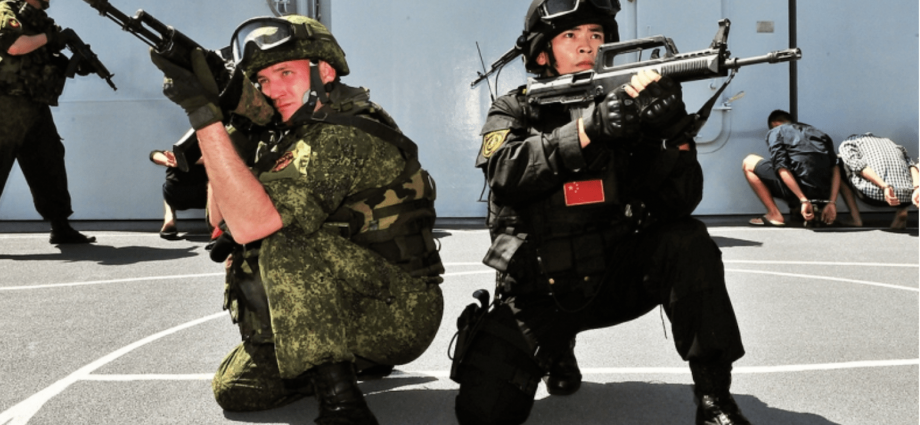As the tragic bloodletting in Ukraine continues to unfold with new intensity, the world awaits the upcoming winter with a new sense of dread and foreboding. On the other side of Eurasia, China has sought to portray itself as an island of stability amidst a turbulent sea.
While an encouraging statement was made recently by a rather authoritative Chinese military expert on the issue of Moscow’s nuclear saber-rattling, Beijing has been mostly silent on the issue or blamed Washington: “The US pushes up ‘nuclear fear’ for strategic self-interest…it is not difficult to see that spreading insecurity by exaggerating nuclear threats…will help Washington.”
Indeed, Chinese Foreign Minister Wang Yi made one of the most emphatic statements of support for Russia during a phone call with Russian Foreign Minister Sergei Lavrov. According to a Chinese report, Wang stated: “China will firmly support the Russian side, with the leadership of President Putin, to unify Russian people to overcome difficulties and interruptions, to realize the strategic goal of development, and to further reinforce the status of Russia as a major power.”
In general, China continues the difficult balancing act of staying loyal to its long-time, close partner Russia, but also trying not to alienate European countries. Since German Chancellor Olaf Scholtz is due to visit China in early November, this determination to preserve some kind of normalcy in China-European relations appears to have at least some basis.
To be sure, Beijing has benefited to some degree from the war in Ukraine. Compared to several years ago, it is not pilloried in the Western press with the same regularity, since Russia now seems to occupy that role full-time, and China may seem more reasonable by comparison.
More concretely, China’s economy has enjoyed a timely boost from cheaper Russian resources. In this respect, China is behaving similarly to India: taking advantage of fire sale prices on Russian exports, notably oil and gas.
One report recently placed Russian total exports up over 50% to China compared to the same data in 2021 and bilateral trade is indeed anticipated to set a record for 2022.

China may also benefit from certain military aspects of the unfolding war in Ukraine. There is not only the opportunity to observe carefully the use of new US weapons, such as HIMARS or Switchblade drones, but the PLA can also assess the doctrines for implementing whole new modes of warfare.
Not surprisingly, Chinese strategists have paid particular attention to certain aspects of the Ukraine War that could be relevant to a Taiwan scenario, including drone warfare, helicopter operations, long-range missile attacks, close air support, urban warfare and also mine warfare. The PLA already seems to be adapting its forces according to lessons it is drawing from that conflict.
Nevertheless, China like most countries around the world is also suffering a host of new challenges due to the Russia-Ukraine conflict. For example, the Belt and Road Initiative, which was already confronting headwinds, now faces a host of new complexities, since Eurasian trade routes have been badly disrupted by the Ukraine War.
Similarly, China has prioritized development of the Arctic and this may still go forward, but the prospects are rather dimmer than before, since Russia’s relations with Europe, Japan and South Korea have sunk back to Cold War-type estrangement.
If there was a near-term ambition to conquer Taiwan, moreover, that could well be more difficult now since Taiwan is at least beginning to get serious about military security.
The above challenges could have been sufficient to prompt China to rethink its quasi-alliance with Russia. Yet, that is quite unlikely because Beijing has simply invested too much in its relationship with Putin’s Russia. Chinese-language sources do indeed indicate a deep well of sympathy among Chinese elites for Russia’s predicament in its confrontation with the West.
Thus, an analysis of the war appearing in the Chinese academic journal Eluosi Yanjiu [Russian Studies] comes to the stark conclusion that “In order to maintain its hegemonic position, the US supports Ukraine to wage hybrid warfare against Russia…The purpose is to hit Russia, contain Europe, kidnap ‘allies,’ and threaten China.”
Similarly, a Beijing expert on Ukraine recently blamed the eastward expansion of NATO and the US “comprehensive containment of Russia” for causing Russia to strike against Ukraine.
Even after Ukraine scored some military successes against Russian forces in September, Beijing has appeared to double down on support for Moscow. One Chinese commentator warned in early October that “The 500-year global expansion of the West has not stopped,” and that “any non-Western civilization [whether Russia or China] must be subordinated.”
Also emphasizing a civilizational struggle at work in the Ukraine War, a dean at the People’s University in Beijing remonstrated: “For centuries, the Anglo-Saxon peoples have dominated the construction of the world system.”

The above window into the Chinese-language discourse about the Russia-Ukraine War implies that China-Russia cooperation is more deeply rooted than most Westerners seem to appreciate. Before alienating Beijing further, it is worth considering the costs of pushing the Eurasian giants into an ever-closer embrace.
For now, China has demonstrated restraint, seeking to safeguard its commercial equities with the West, but active efforts to contain China, like cutting off China’s access to semiconductor technology, are bound to precipitate retaliation that could damage US interests and friends.
A Russian news report on October 23 showed a truckload of Chinese drones being unloaded to supply Russian troops fighting in Ukraine. That could be the tip of the proverbial iceberg if Beijing opts to increase its support for Moscow.
Lyle Goldstein is director of Asia engagement at the Washington think tank Defense Priorities, a visiting professor at the Watson Institute for International and Public Affairs at Brown University in Providence, Rhode Island, and the author of “Meeting China Halfway: How to Defuse the Emerging US-China Rivalry.”

